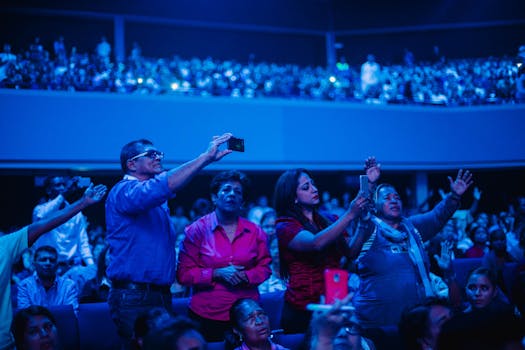Music marketing is an ever-evolving landscape that involves various strategies to promote music and engage audiences. As the music industry shifts towards digital platforms, artists, managers, and labels must adapt their marketing strategies accordingly.
Understanding music marketing is crucial for both emerging and established artists. With countless numbers of musicians vying for attention, having a solid marketing plan can set you apart from the competition.
This guide aims to provide insights into effective music marketing techniques and strategies that can help artists achieve their goals. Let’s dive into the essential aspects of music marketing that can transform your music career.
Understanding the Basics of Music Marketing
Music marketing involves promoting artists and their music to maximize reach and engagement. This can include online platforms, traditional media, and live performances.
The evolution of music has created new avenues for marketing, particularly through social media and streaming services. Utilizing these platforms provides artists with direct access to their audiences.
At its core, music marketing combines creativity and strategy. Artists need to craft compelling narratives, visuals, and experiences that resonate with their audience.
Furthermore, knowing your target audience is crucial. Understanding whom your music appeals to allows for tailored marketing strategies that effectively engage potential fans.
Finally, measuring the effectiveness of your marketing efforts helps refine strategies over time. By analyzing data, artists can understand what works and what doesn’t.
The Role of Social Media in Music Marketing
Social media has transformed how artists communicate with their audience. Platforms like Instagram, Twitter, and TikTok allow for direct engagement and content sharing.
Creating a unique voice on social media helps artists build a personal brand. Consistent posting and interaction foster a loyal fan base and promote upcoming projects.
Moreover, platforms like TikTok have become powerful tools for discovering new music. Viral trends can catapult an artist to fame virtually overnight.
Engagement is key on social media; responding to comments and messages helps cultivate a connection with fans. This interaction creates a community around your music.
Lastly, paid advertising on social media can enhance reach. Tailored ads can promote single releases, merchandise, or concert tours effectively to a wider audience.
Building an Effective Music Marketing Plan
Creating a music marketing plan involves outlining your goals, target audience, and key messages. A well-structured plan keeps marketing efforts focused and effective.
Start by identifying your unique selling proposition. What makes your music or brand stand out in a crowded market? This differentiation is vital for impactful marketing.
Your plan should also include various marketing channels. Consider a mix of digital campaigns, physical promotions, and live events to reach a broad audience.
Setting measurable objectives is essential for tracking progress. Goals could range from increasing social media followers to boosting streaming numbers or ticket sales.
Finally, revisiting and revising your marketing plan regularly is crucial. The music landscape changes rapidly, and staying adaptable ensures continued relevance.
Utilizing Digital Platforms for Music Promotion
Digital platforms have revolutionized music promotion and distribution. Services like Spotify, Apple Music, and YouTube play pivotal roles in how music is consumed.
Getting your music on streaming platforms is a critical step. Distributors such as DistroKid or TuneCore help artists release their music into digital stores.
Moreover, creating engaging content for YouTube can attract new listeners. Music videos, lyric videos, and behind-the-scenes clips enhance your online presence.
Additionally, using digital press releases to announce new music can generate buzz. A well-crafted release distributed via blogs or social media helps reach broader audiences.
Finally, consider collaborating with influencers. Partnering with social media personalities or musicians can expose your music to new fans and capitalize on their reach.
Merchandising as a Marketing Strategy
Merchandising is an effective way to promote music and generate revenue. Quality merchandise can strengthen your brand while providing fans with tangible connections to your music.
From T-shirts to vinyl records, various merchandise options can engage fans. Limited-edition items create urgency and encourage fans to make purchases quickly.
Having a dedicated online store simplifies the process of selling merchandise. User-friendly platforms allow artists to manage sales and showcase their products effectively.
Moreover, physically selling merchandise at live shows can increase revenue and promote brand visibility. Fans often love to take home a piece of the concert experience.
Lastly, integrating merchandise promotions into your marketing efforts amplifies their reach. Featuring them in social media posts, newsletters, or concerts keeps them relevant.
The Power of Live Performances
Live performances continue to be one of the most effective marketing tools for artists. They allow for personal interactions with fans and create memorable experiences.
Moreover, touring helps increase music sales and streaming numbers. Performing live can lead to increased interest in your recorded music.
Additionally, participating in music festivals provides exposure to larger audiences. Such events attract diverse crowds and can help introduce new fans to your music.
Quality performances also generate word-of-mouth promotion. Fans who have seen a great show are more likely to share their experiences and recommend your music.
Finally, integrating social media content from live performances showcases your energy and talent. Sharing these moments connects you with fans who couldn’t attend.
Building Relationships with Industry Professionals
Networking within the music industry is vital for long-term success. Building relationships with producers, managers, and promoters can create new opportunities.
Attend music events, conferences, and workshops to meet industry professionals. Engaging in conversations can lead to fruitful collaborations and opportunities for growth.
Moreover, establishing connections with local venues and promoters can facilitate future performances. A solid reputation within the community opens doors for artistic opportunities.
Additionally, consider expanding your professional network through social media. Platforms like LinkedIn allow you to engage with industry experts and showcase your work.
Lastly, maintaining these relationships over time is essential. Regularly check in with industry contacts to stay updated and relevant in the music scene.
Conclusion: Navigating the Music Marketing Landscape
Navigating the world of music marketing requires a blend of creativity, strategy, and adaptability. As the music industry evolves, so must artists and their approaches.
By leveraging platforms like social media, streaming services, and live performances, artists can create robust marketing strategies. Each element contributes to building a strong artist brand.
Competitiveness in music marketing necessitates continuous learning and adaptation. Engaging with audiences and crafting unique experiences will always yield positive results.
Ultimately, successful music marketing allows artists to connect deeply with fans, enhance their reach, and thrive in the challenging music environment.
With dedication and a strategic approach, any artist can elevate their music career and realize their dreams.


